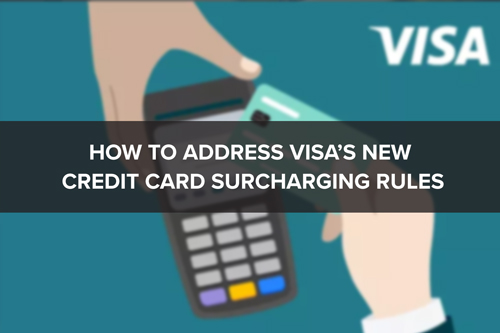Credit card surcharging allows merchants to pass on payment processing fees directly to customers. It can provide much-needed relief to merchants dealing with rising costs. However, credit card surcharging requires that merchants comply with rules and regulations or face consequences. Visa has recently introduced new surcharging rules that will impact compliance for merchants. Here’s what you need to know:
What is changing?
On April 15, 2023, Visa introduced new rules regarding surcharging. It’s critical to help your clients understand the changes, and how they will impact their current practices to avoid hefty fines. According to a recent TSG survey, 30 percent of small business owners report an unclear understanding of the surcharging practice. Regulators will be hyper-vigilant regarding the new rules, and merchants in violation will face the consequences even if the violation was unintentional or accidental.
Here’s how to ensure your clients comply:
 Maximum Allowable Percentage Lowered to 3 Percent
Maximum Allowable Percentage Lowered to 3 Percent
Visa’s new credit card surcharging rules lower the maximum percentage of surcharges from 4 percent to 3 percent, and fines for violating this rule start at $30,000 per incident. In some cases, this cap may be less than the payment processing fees, which means the merchant won’t recoup the total amount. Merchants in the habit of passing on the previous approved surcharge amount will be in danger of getting fined.
- Disclosures and Notifications
Under the old rules, merchants needed to notify Visa of the intent to surcharge. The new rules state that only a merchant’s acquirer needs notification thirty days before implementing surcharging. Though not a new regulation, merchants must still ensure that they are making consumers aware of the surcharge at the point of sale and on every receipt, whether a consumer purchased in-store or online, and clear signage of surcharging must be posted at any point of entry.
With many merchants quickly moving to online payments in early 2020, it may have been an oversight to ensure compliant language on any checkout pages. Work with your clients to do an audit to ensure they are within regulation.
- New Rules Impact Visa Credit Card Transactions
The new credit card surcharging rules apply only to Visa credit card transactions. Other card issuers will have different rules. Additionally, Visa debit card transactions, even when they are used as credit, never qualify for surcharging, nor do Visa gift cards. Merchants in the habit of not keeping track of where and how they apply surcharges are in danger of receiving hefty fines. An efficient and effective way to help your clients quickly, easily, and automatically apply a surcharge on applicable cards is to integrate a surcharging solution with real-time BIN lookup to determine a card’s eligibility for surcharging.
- Monitoring of Field 28 for Compliance
A key reason that Visa no longer needs notice of credit card surcharging is that they will now require the use of “field 28” and monitor it for compliance. In this way, field 28 acts as a notification to Visa of merchants surcharging and places the responsibility for handling the surcharge on the acquirer. Talk with merchants about how to implement this process change to avoid fines or losing the ability to accept Visa cards completely. With the requirement of field 28, it will be easier than ever for Visa to monitor surcharges, and merchants out of compliance will become glaringly evident. When processing transactions using Datacap’s NETePay Hosted platform, make sure you include the <SurchargeWithLookup> tag as part of the transaction request to include field 28 for applicable transactions.
A Trusted Advisor Will be Straight with Clients
While credit card surcharging sounds like an ideal opportunity for merchants to maintain a better balance of expenses when it comes to payment processing fees, your clients need your help to understand what is at stake. Beyond complying with rules or risking fines or loss of the ability to accept payment cards, merchants should consider consumer sentiment. With 44 percent of credit card users attesting to being “very” or “extremely” likely to switch merchants when surcharges are applied, and 67 percent admitting that surcharges negatively impact their impression of a merchant, surcharging might win back dollars in the short term only to bring deeper losses long-term.
Be ready to discuss all of the costs of the new rules as well as current consumer sentiment so that merchants can make an informed decision and put into action the best way for them to effectively maximize revenues and profits. Contact us to learn more.



